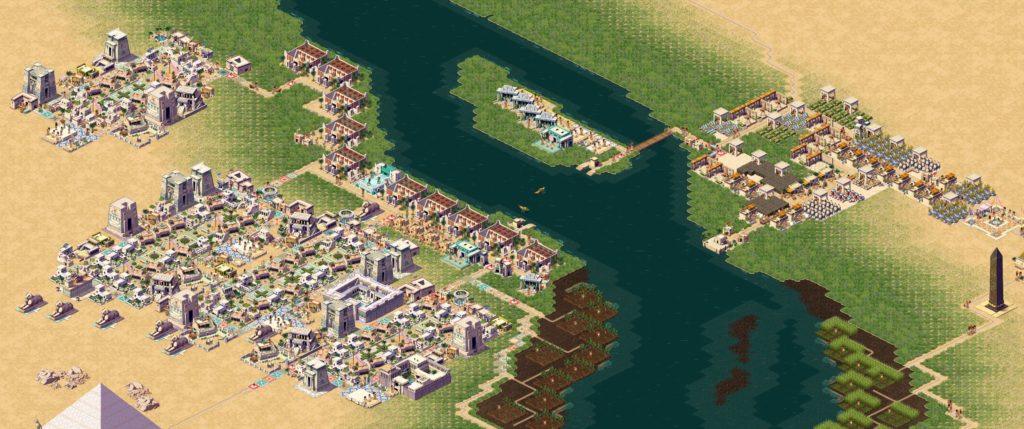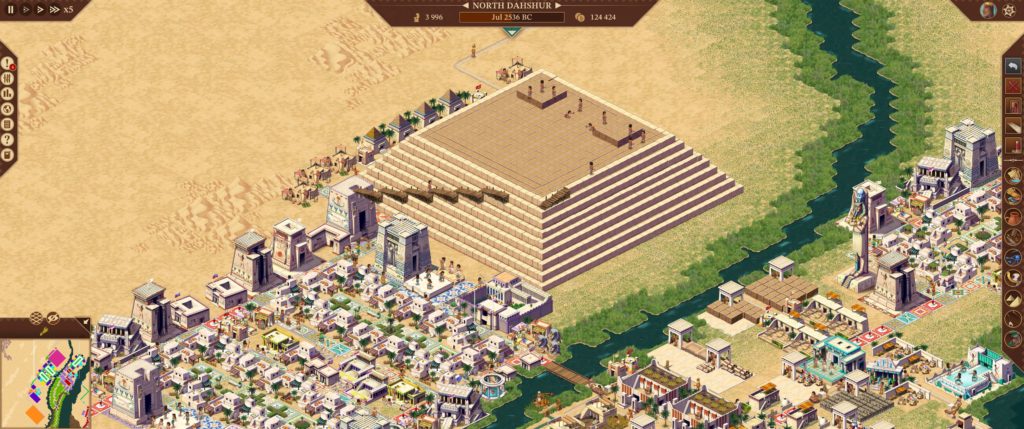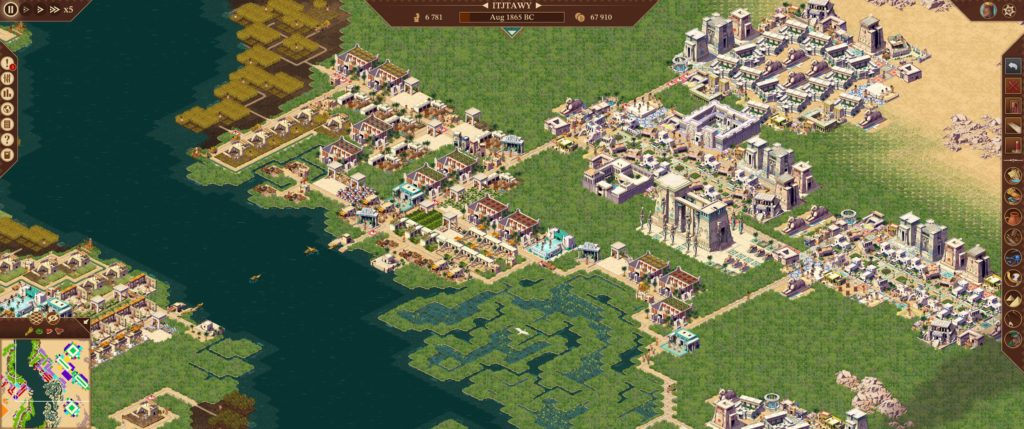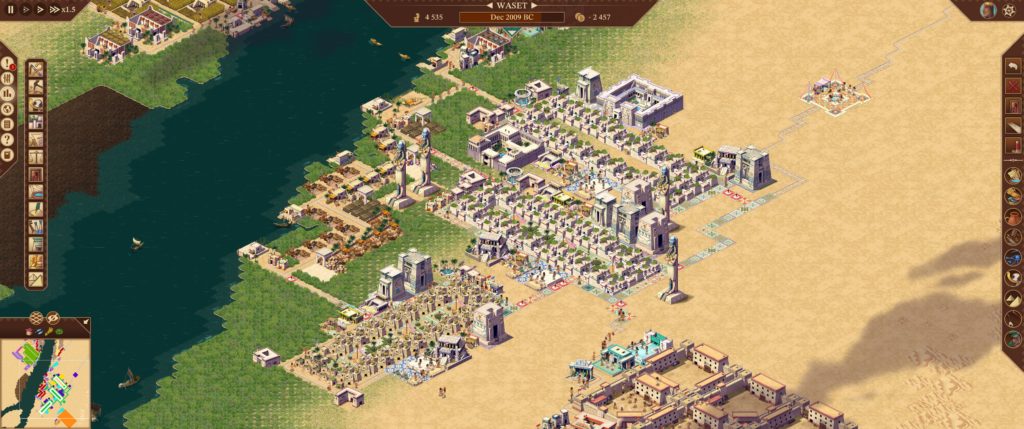- Genre: City Builder
- Platform: PC
So I suppose this is a bit of a look at how an old game aged, and a bit of a look at how a remake both did and didn’t change a game. Pharaoh is a game that I played when it first came out, and is something that I’ve continued to come back to on and off throughout the years since. This is really the first city builder that hooked me. I’d played some SimCity on SNES, SimCity 2000 on PC, and dabbled a bit in Caesar 3, but none of them really got their hooks in me like this one. However, it had some distinct issues that have never really gone away for me as I play through it, and for better or worse a lot of that is maintained in the remake, though it does come with a few nice tweaks.

I think this screenshot is a good place to start, because it really shows the main thing that drew me to playing the remake over the original. They added a global worker pool mechanic that later games like Zeus started playing with. In the original game, your places of work had to be close enough to housing to allow recruiters to find people for the jobs. What this meant at least for me was that instead of designing cities I was haphazardly putting together pods of industries where they needed to be with pods of housing connected to them, but not too close so their desirability wouldn’t be affected. It always felt like a weird restriction to me in terms of how I wanted to go about designing my layouts. The global worker pool fixes that.
Now, I simply need to have enough people in the city to fill the jobs. What this means for me is that I can design my cities with distinct regions. I can have industrial regions, where resources and production buildings are grouped in ways that make sense for efficient creation, storage, and ultimately trade purposes. I can then have housing in areas where it will best allow it to both have access to everything it needs, as well as room for the buildings to expand in later levels to high-level 3×3+ housing. It makes the entire city creation process about designing rather than fitting to specific mechanical needs.

There’s also an additional sub-option that changes the underlying worker availability from being age-based to just being a flat percentage, and this is unfortunately a good option covering up a mechanic that I feel still doesn’t work right. The underlying default worker pool is anyone in your town from age 20-49. This works great as your city grows and workers move in. However, once your housing capacity is reached it becomes a long term problem. There seems to be an underlying mechanical issue where people just do not have children at a replacement rate so your city ends up ultimately aging out. To keep the worker pool up, you end up just constantly chasing a growing population or doing mechanical cheesing, such as deleting an entire neighborhood and rebuilding it to get new immigrants.
At the time of the game’s release it felt like potentially a systemic limitation that was just annoying. However, it feels like something that should just be fixed. The flat percentage worker pool is an alright solution, and honestly gets me my goal of having a city that I can grow to a predictable size. However, I’d have liked a more elegant solution where roughly stable populations also have roughly stable birth rates, and I can plan around that. Yes, I expect that cities with full health care coverage would have more older citizens that age out of the worker pool, but it’s so aggressive in both the original and remake that it feels broken.

That isn’t the only thing that I kind of wished had more elegant solutions. In the original release as well as the remake I end up hitting a point in the middle kingdom period where mechanically the game just becomes something I don’t want out of a city builder. You reach a point where you’ve kind of seen everything so the game becomes less about city building and more about speed running. You start getting into levels that expect you to have a lot of industry up and running extremely early, and if you don’t do things just right you start suffering consequences such as the pharaoh invading your city. It ultimately is not how I want to play a city builder. I find it more interesting to be chasing layouts and efficiency within that rather than hitting mechanical bullet points, and the later levels just feel like you should build in precise locations at precise times and learn that via being defeated. It’s at that point where I tend to fall into just doing mission editor free play on cool spots.
The game also really did nothing to alleviate boredom around the god mechanic. The tl;dr is you need to keep gods happy or suffer negative consequences. If you keep them happy you have positive consequences. Unfortunately, the practical way to do this is to just routinely hold festivals in their honor. It’s so robotic of a mechanic that I’d almost rather neither positive or negative consequences existed, and the whole thing just went away. Long wait periods while monuments are being built just turn into clicking the festival button every couple months and doing that in repetition for long periods of time. It felt unnecessary 25 years ago and feels unnecessary now.

All that being said, I’m glad this remake is out and is still seemingly being worked on. This offers me a hugely easier way to do my semi-regular hop into the game. It gives me modern perks like ultrawide support and cloud saves. It modernizes a few mechanics and gives me hope that they’re going to be willing to do more to create an ultimately better experience. And I suppose what it really gives me is hope that city builders are still a popular enough thing to exist within some niche on Steam. I would say that since this game came out I’ve leaned more heavily into open-ended builders like Timberborn, but I think there’s still a place to explore more history-focused task-oriented builders like Pharaoh, though I do want to see more of a push to fix what wasn’t liked about the originals if the studio behind this does end up going into later titles.
